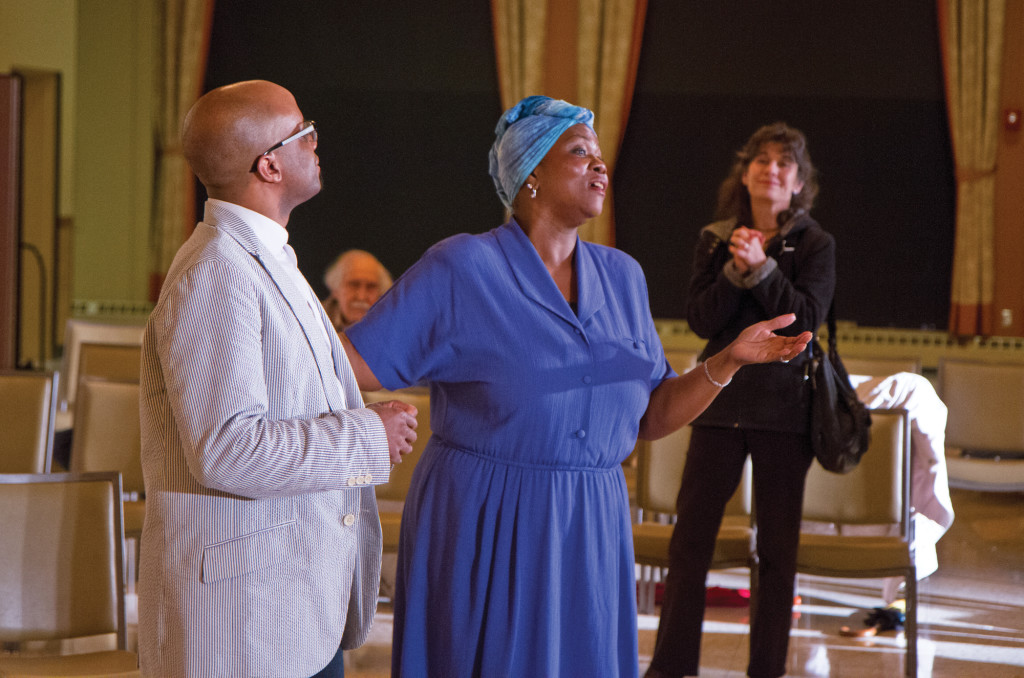The Passion, the period in Jesus’ life ranging from when he entered Jerusalem to his crucifixion, is one of the most well-known stories on Earth. From Hollywood to local churches, the story has been told time and time again in countless settings.
Students at Seattle University now have the chance to see the Passion in an entirely
new light.
Playing for a limited engagement in Campion Ballroom this week and next, “The Negro Passion Play” places the story of Jesus’ crucifixion within the context of the civil
rights movement.

At the finale of the show’s opening night on April 8, director Tyrone Brown and Michele K. Edwards lead the audience in a final song.
The story begins when two black teenagers, Mary Magdalene (Zenobia Taylor) and Martha (Treonna Glover), attend an all-white Sadduccee Church. When the church’s leader, Reverend Caiaphas (John Ruoff), demands that they leave, the girls hold their ground and are arrested.
Jesus (Lyndon B. McKinney) is pastor of the Nazareth Baptist Church and his disciples soon hear about the event and become embroiled in the conflict. Jesus suddenly finds himself at the head of a movement for desegregation in the Church.
Tyrone Brown, the piece’s creator and director, works at Seattle U as the administrative coordinator for counseling and psychological services. For him, the idea of setting the Passion play within the context of the civil rights movement had always been an interesting concept.
“[The Passion Play] is probably the most popular form of theater in the world,” he said. “And it’s seen by a huge amount of people.”
When he received Seattle U’s Endowed Mission Fund last year, he was able to begin making the project a reality.
Brown had originally intended to hire a writer to work on the play, but ended up utilizing a more dynamic form of directing called devising to create the play’s dialogue. This involved working with the actors over the course of rehearsals to feel out their characters and decide what each felt should be happening at any point in the play.
This process involved a pre-rehearsal period, which was followed by showings of the work to members of the local community. Brown and the group would get feedback from the audience and then return to work more on the script. Because of this process, the ensemble didn’t have a script until just two weeks ago.
According to Brown, many actors in the production likened him to John the Baptist, wild haired and eccentric, assuring his fellow believers that their work would pay off, despite the numerous changes and rearrangements leading up to the performances.
“It was always an act of faith for me,” he said.
The feedback from the community was helpful in keeping the story close to its biblical roots. According to Brown, the crew took some liberties with the story even before they received this feedback, though they kept the general narrative arc the same.
“After one of our performances, someone came up to me afterward and told me that they liked it,” he said. “But that they weren’t ‘feeling the love of Christ.’”
Feedback like that, Brown said, sent the cast and crew back to the Bible itself to continue working on and perfecting the piece.
The play doesn’t sugarcoat its content, or obscure the connections between Jesus’ own trials and the ugliness of 1950s America. Upon entering the theater, the audience is segregated, with people of color on one side of the ballroom and the “Sadduccees” on the other. The effect, from the very beginning, is viscerally uncomfortable in ways that drives the work’s social justice message home.
This emphasis on the violence and terror that characterized the time period is similarly present during the play’s final portion, when Jesus is forced to carry the cross. We watch as the Sadducee characters that condemned him celebrate while he stumbles by in a crown of cotton.
Brown says that his hope for what students take from the play is two-fold: “As someone involved in theater, I want them to enjoy the play and appreciate a contemporary take on the Passion. But I also want this to be a reminder about taking creative risks. If you want to make a Passion play and set it in a different context, why not? Maybe people will be inspired to do their own production.”
The show will be performed April 10, 15 and 17 at 7:30 p.m. in the Campion Ballroom. Student price is $10 and general admission is $15.








